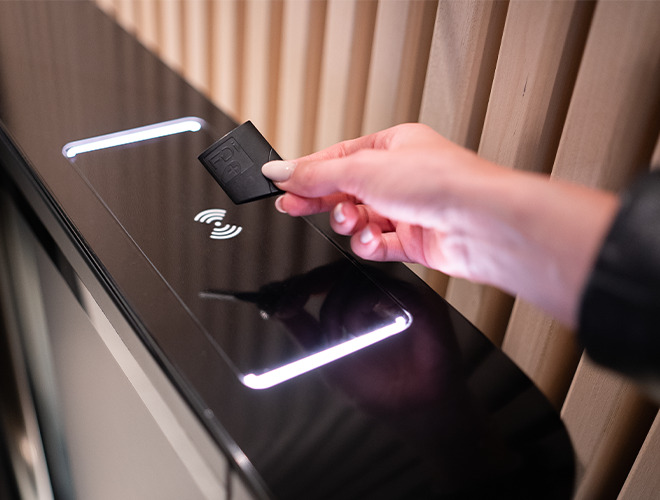FDI ELECTRONIC CREDENTIALS OR TRADITIONAL PHYSICAL KEYS?
In the commercial and residential markets, mechanical keys – mechanical metal credentials for traditional locks – are still widely used. These keys are easy to use and duplicate, making them convenient to use when several people need access to the same premises. However, the security of traditional keys is compromised by the ease with which these everyday objects can be duplicated or reproduced.
With the growing need for secure access, FDI offers an alternative with a higher level of security and identification.
As a manufacturer of access control, intercom and IoT systems, FDI offers identification credentials with a higher level of security and identification. In fact, FDI electronic keys are a serious alternative to physical keys. FDI electronic credentials offer a higher level of security thanks to the embedded proprietary FDI protocol, as well as versatility of use: one electronic credential is enough to access several doors.

FDI badges, more secure credential
Thanks to their embedded technology, FDI electronic credentials are non-reproducible and offer enhanced security by preventing unauthorized duplication.
To meet the market’s growing need for security, FDI electronic credentials can be combined with a dual authentication process, for example, by adding a PIN or fingerprint to secure the identification of the badge-holder a second time. In this way, even if the credential is lost or stolen, access to the secure area remains protected thanks to the double authentication process, whereas traditional keys can still be used by any user in possession of them.
Focus on the proximity keyWHY CHOOSE FDI ELECTRONIC BADGES?
Uniqueness and traceability
FDI access control systems are combined with iPassan, an access management software package that tracks site events. For example, iPassan enables real-time tracking of user accesses, user identification, and user accesses at a given date and time. The tracking software also detects refused accesses and sends alerts accordingly. Thanks to the traceability of the iPassan access control system and the proprietary FDI protocol embedded in each identification card, FDI ensures the highest possible level of security. The use of these access management systems is proving highly effective in hybrid buildings where commercial, tertiary and residential areas coexist, enabling all zones to be partitioned and secured.
Versatile, personalized access
In addition to the high level of security provided by FDI credentials, these identification credentials are practical for end-users, as they can be used in more than one access control zone. FDI electronic badges can also be used for :
– Access control,
– Time management when used in conjunction with badge readers,
– Equipment identification, e.g. photocopiers, coffee machines,
– Identification and activation of electrical charging stations,
– Reservation of equipment or rooms,
– And much more…
It should be noted that each application can be equipped with different levels of security, thanks to the use of separate encryption keys integrated into FDI credentials.
Cost-effective solution
In financial terms, the electronic credential is more advantageous than the classic mechanical key. A badge costs less to manufacture and stands out as an economical and more affordable option.
Also, the cost of one badge per user – allowing multiple accesses – is more advantageous than a set of a dozen keys.
FDI ALSO INTEGRATES RFID CHIPS INTO TRADITIONAL MECHANICAL KEYS
In some cases, it makes sense to link a mechanical key to an RFID chip. FDI masters this know-how and is able to associate an RFID tag with a traditional metal key. In this way, the mechanical key retains its authenticity while locking the bolt. The RFID chip, on the other hand, enables additional authentication to be added, ensuring that only users with access rights can access the secure area.
This innovation requires a high level of know-how and technical expertise to ensure that RFID chips are properly integrated into the mold of physical keys.
At present, few players on the market are able to combine physical keys and RFID tags. FDI’s expertise and experience as a designer and manufacturer of access management systems has enabled it to apply its know-how to this specific need for RFID chip production. Today, FDI supplies its products to one of the world’s largest players in the market, with over 20,000 RFID badges integrated into traditional keys.

